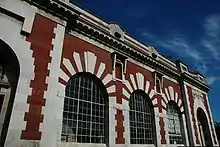Metropolis Group
Metropolis Group is a music production and entertainment industry company established in 1989 by Gary Langan, Carey Taylor and Karin Clayton.[1] It is located in the Powerhouse, a Grade II listed building, at 70 Chiswick High Road in Chiswick, London, England. Over the last twenty years the group has expanded and now consists of three divisions: Metropolis Studios, Metropolis Mastering, and Digital Media/Productions.
 | |
 The Powerhouse | |
| Type | Recording studio |
|---|---|
| Industry | Music |
| Founded | 1901 |
Area served | City of Westminster, London, England |
| Website | thisismetropolis |
Metropolis Group was bought out on 31 May 2013 by 'MLML (Metropolis London Music Limited)' by Kainne Clements,[2] (who also owns the Academy of Contemporary Music) The Group in 2017 gained a new CEO Richard Connell, a former Sony Music executive.[3]
History of the Powerhouse
The Powerhouse was built in 1901 by a young architect William Curtis Green to power the trams of West London.[4] It originally had a 260-ft. high steel smoke-stack.[5] On the façade, are two large female figures that represent `electricity’ and `locomotion’.[6] This substantial building was conceived to be so large as to prevent any of the houses in the neighbourhood (which still tended to be large properties with influential owners) suffering from the vibration and dust caused by the steam powered generators. Due to competition from Lots Road power station in Chelsea, power was only generated until 1920 when the building was decommissioned and stripped of its equipment. Being mainly used as a storage facility, the Powerhouse gradually fell into disrepair.
Then in 1962 the trolley bus service was closed, the chimney was then demolished in 1966.[6] London Transport (by then the owners) decided to redevelop the site. This led to an outcry and the Victorian Society campaigned for the protection of the building from the developers, which in turn led to the building being listed in 1975,[7] one of the first Victorian buildings to be so nominated, and the first that was built in the 20th century. In 1985, the upper part of the building was converted into flats, including a penthouse which is split over three levels.[8] In 1989, after a large scale redevelopment, the lower part of the building was converted into a recording studios,[4] and the home of Metropolis Group.
Studios
Metropolis Studios consists of four floors, and 5 recording and mixing studios and four production rooms. It has a concrete and metal atrium, with steel, plywood and render in other rooms. In the studios, the design engineers have placed obtuse angle to refract sound.[9] Studio B was used as the London mixing studio for Mark Ronson, when he produced the 'Back to Black' album for Amy Winehouse.[1] The studios has also been used in the past by Queen, Michael Jackson, U2, Lady Gaga, Adele, Rihanna and Lauryn Hill.[10]
Notes
- Donald Brackett Back to Black: Amy Winehouse's Only Masterpiece, p. 99, at Google Books
- "Metropolis Studios runs music business expansion on FileMaker". computerweekly.com.
- Sutherland, Mark (17 November 2017). "New CEO Richard Connell to boost Metropolis studio business". musicweek.com. Retrieved 17 March 2018.
- Oliver Green Rails in the Road: A History of Tramways in Britain and Ireland, p. 111, at Google Books
- "Chiswick: Economic history". british-history.ac.uk. Retrieved 16 March 2018.
- Clegg, Gillian. "CHISWICK HISTORY, Travel". doricdesign.com. Retrieved 17 March 2018.
- "Former Tramways Sub-Station at". britishlistedbuildings.co.uk. Retrieved 17 March 2018.
- "The Power House Chiswick High Road, Chiswick, London, W4 1SY". savills.com. Retrieved 16 March 2018.
- Kenneth Allinson and Victoria Thornton Guide to London's Contemporary Architecture, p. 99, at Google Books
- "IN THE MIX: METROPOLIS STUDIOS". m-magazine. 10 March 2015. Retrieved 17 March 2018.